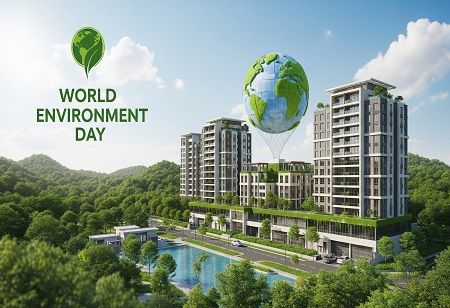
As the world observes World Environment Day with the theme “Ending Plastic Pollution,” the conversation around sustainability has moved beyond policy to on-ground transformation—and the real estate sector is emerging as a critical driver of this change.
With over 430 million tonnes of plastic produced each year globally, and a significant portion ending up in landfills and oceans, industries across the board are being challenged to rethink their impact. Among them, real estate holds a unique position, contributing close to 40 percent of global carbon emissions, but also possessing the power to reverse that trend through sustainable development.
Ashok Kapur, Chairman, Krishna Group and Krisumi Corporation - "The real estate sector bears a significant responsibility towards the environment, particularly as India’s housing segment accounts for over 30 percent of greenhouse gas emissions. This makes it imperative to embrace practices that support development while fostering sustainable living. As the nation advances towards its goal of net-zero carbon emissions by 2070, every industry, including real estate, must play a proactive role in shaping a greener future.
At Krisumi, sustainability is at the core of our philosophy. Our projects are meticulously designed with eco-friendly features and sustainable architectural principles to minimise environmental impact. This commitment not only nurtures ecological balance but also enhances the overall living experience for our residents".
Mahesh Ramanujam, Founder and CEO of the Global Network for Zero - "On World Environment Day, we are reminded that sustainability is not a one-time milestone, but a systemic and enduring commitment to regeneration and resilience. As India advances toward its net-zero goals and the larger vision of Viksit Bharat, environmental leadership must be embedded into every decision — from manufacturing floors to building blueprints. With India now the world’s fourth-largest economy and over 600 million citizens expected to live in urban centers by 2035, how we design our buildings, manage our resources, and reduce our waste, including plastics, will define the trajectory of our growth.
At the Global Network for Zero, we see buildings as the first frontier of climate action. They consume energy, generate emissions, and create material waste, but they also hold the key to transformation. By embedding emissions reduction, circularity, and resource efficiency into the way we build and operate, we believe we can decarbonize India’s infrastructure — one office, one factory, one community at a time. Net zero must be reframed not as an exclusive destination for the few, but a continuous, inclusive journey powered by innovation, local leadership, and scalable frameworks".
Vineet Aggarwal, COO, Paras Health - "Protecting the environment is not just a responsibility — it’s an essential part of holistic healthcare. On World Environment Day, we are reminded that the health of our communities is deeply connected to the health of our planet. Our hospitals are taking active steps towards sustainability, from energy-efficient infrastructure and responsible waste management to reducing single-use plastics and creating green spaces on our campuses. We are also engaging with staff, patients, and partners to build awareness around the importance of environmental consciousness in healthcare. As healthcare providers, we see every day how environmental factors affect public health. We must lead by example. Our commitment goes beyond treatment as it includes prevention and long-term sustainability. A healthier environment leads to healthier lives, and that’s the future we are working toward.
India’s broader vision for the future includes transitioning towards net-zero emissions by 2070, with the real estate and infrastructure sectors playing a defining role. Policy support, such as FAR incentives for green buildings, fast-track environmental clearances, and increasing access to green finance, are helping accelerate this shift. States like Maharashtra, Haryana, and Gujarat are leading the charge with progressive frameworks that reward sustainable construction".
Looking ahead, the green transformation of India’s real estate sector will be shaped by four major trends: wider adoption of climate-linked real estate financing instruments, the use of AI and data analytics in building energy management, incorporation of biodiversity corridors within large-scale projects, and the circular use of materials through modular construction and recycling.
As the world calls for urgent action to end plastic pollution and reduce emissions, India’s real estate sector has begun to redefine its role—from being a source of environmental pressure to becoming a core part of the solution. World Environment Day 2025 is not just a reminder of the challenges, but recognition of the opportunities to build better.
Also Read:
➤ Reimagining Urban life with Mixed-Use Brilliance
We use cookies to ensure you get the best experience on our website. Read more...
Copyright © 2025 HomesIndiaMagazine. All Rights Reserved.